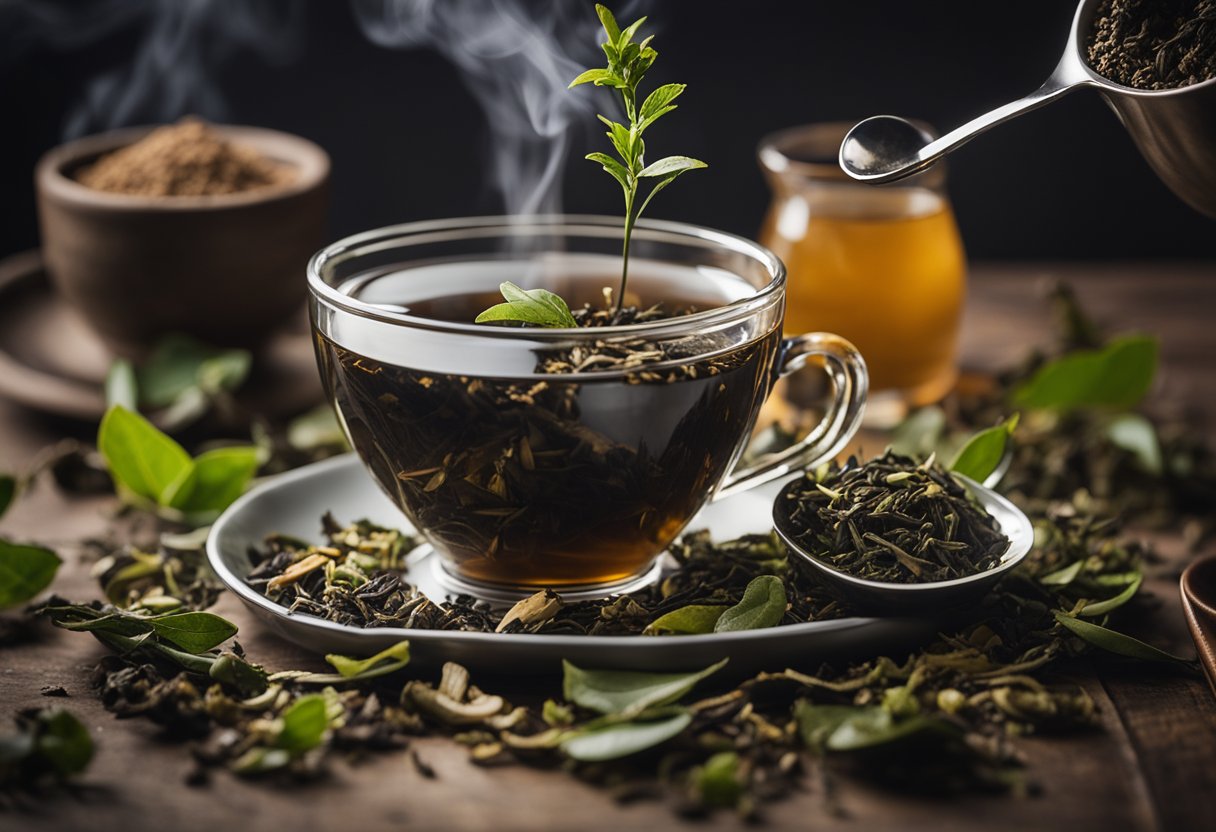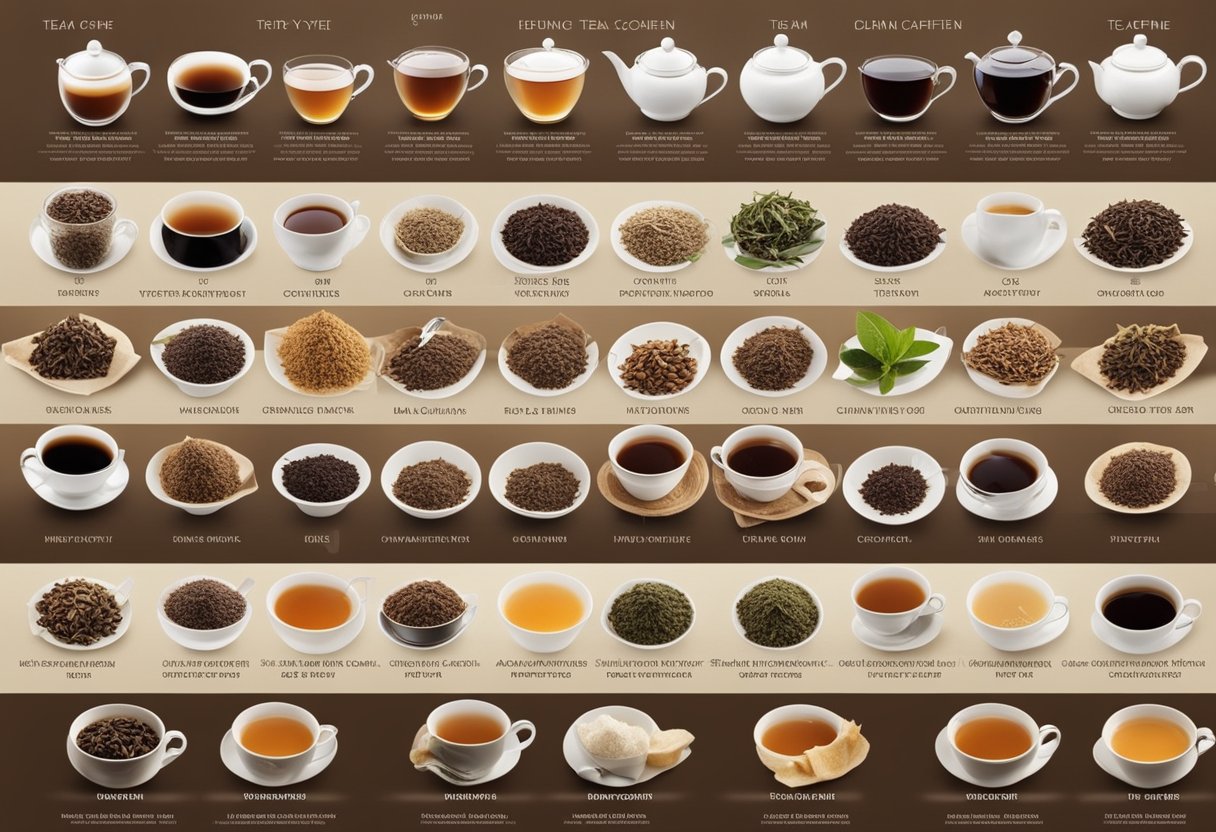How much caffeine in tea? Understanding Your Cuppa’s Kick
Caffeine is a natural stimulant most commonly found in tea, coffee, and cacao plants. It works by stimulating the brain and central nervous system, helping you stay alert and prevent the onset of tiredness. Historically, tea has been a popular choice for those looking to enjoy the benefits of caffeine without the intensity of coffee. However, the amount of caffeine in tea can vary greatly depending on factors such as the type of tea, the way it’s processed, and how it’s brewed.

When considering the health implications of caffeine consumption, it’s essential to understand how much caffeine is present in a cup of tea. Health experts often weigh in on the safe levels of caffeine, recommending that adults limit their intake to avoid the negative side effects, which can include restlessness and sleep problems. The caffeine content in a single cup of tea can range significantly with black, green, and white teas often containing the highest amounts.
Understanding the caffeine levels in different types of tea can help tea enthusiasts make informed decisions about their drinking habits. Whether one chooses a strong black tea in the morning for a caffeine boost or a lighter white tea in the afternoon, knowing the caffeine content is crucial for managing intake in line with health recommendations. It’s also worthwhile noting that decaffeinated tea options are available for those looking to reduce their caffeine consumption without giving up their favourite brews.
Caffeine Content in Different Types of Tea

When exploring the varying caffeine amounts in tea, one finds that factors such as the type of tea leaf, brewing process, and water temperature play pivotal roles in determining the final caffeine content.
Black Tea and Its Caffeine Levels
Black tea, derived from the Camellia sinensis plant, is known for its higher caffeine content, which can typically range between 64 and 112 milligrams per 8-fluid ounce serving. This concentration can differ based on the tea’s strength and duration of brewing. Black tea is a staple for many due to its bold flavour and potential health benefits.
Green Tea: A Comparison
In contrast, green tea possesses a more moderate caffeine level, often containing about 25 to 50 milligrams per 8-fluid ounce cup. Despite its lower caffeine content, green tea is rich in antioxidants, which contributes to its beneficial properties for health.
Decaffeinated and Herbal Teas
Decaffeinated teas undergo a process to remove most of the caffeine, resulting in about 1 to 5 milligrams per serving. However, they are different from herbal teas like rooibos, which are naturally caffeine-free. Pregnant women often opt for herbal teas, as consuming high levels of caffeine can pose health risks during pregnancy.
Factors Affecting Caffeine in Tea
The caffeine content in tea can be influenced by several factors. These include the part of the Camellia sinensis plant used, and the brewing process, with water temperature and time playing crucial roles. Brewed for longer periods and at higher temperatures, the tea leaves release more caffeine, enhancing the beverage’s stimulating effects.
Health Considerations and Effects
When considering the impact of caffeine from tea on health, one must weigh the balance of benefits against potential side effects. It’s also important to understand how these effects might differ among various groups, such as pregnant women and individuals sensitive to caffeine.
Benefits and Drawbacks of Caffeine
Benefits: Caffeine, a stimulant found in tea, can enhance alertness and energy levels. The antioxidant properties of tea are attributed to compounds like theanine and catechins, which may help with weight loss and reduce the risk of heart disease and cholesterol issues.
Drawbacks: Excessive caffeine can lead to restlessness, anxiety, headaches, and disrupted sleep patterns. High caffeine intake may also elevate blood pressure and contribute to potential health risks.
Tea and Health: An Overview
Tea, derived from Camellia sinensis, contains various polyphenols which have been linked to numerous health benefits, including a lowered risk of skin cancer and diabetes. However, the caffeine content in tea can vary. Black tea and green tea typically have higher levels of caffeine compared to white or herbal teas.
Advisory for Specific Groups
- Pregnant Women: They are often advised to limit their caffeine intake due to potential impacts on fetal development. Medical advice generally places a safe upper limit at lower levels than those for non-pregnant individuals.
- Children: They are more sensitive to caffeine and should therefore consume it in very limited amounts or avoid it altogether.
- Individuals with Health Issues: Those with sleep disorders or high blood pressure should exercise caution with caffeine.
Tips for Managing Caffeine Intake
- Compare caffeine levels in different types of tea and opt for decaffeinated teas if necessary.
- Be aware that even decaf coffee and tea can contain small amounts of caffeine.
- Limit intake of other caffeinated products such as espresso, latte, and instant coffee to manage overall caffeine consumption.
To maintain a healthy lifestyle when enjoying tea, it is essential to be mindful of the caffeine levels and how they may affect individual health conditions. Remember that while tea can be a beneficial drink, moderation is key.
Frequently Asked Questions
When discussing the caffeine content in tea, it’s important to address common queries to give a clear understanding of how tea’s caffeine level stands in relation to other beverages and its implications for health.
How does the caffeine content in tea compare to that of coffee?
The amount of caffeine in tea is generally lower than that in coffee. A cup of coffee might contain about 95 milligrams of caffeine, whereas a typical cup of black tea usually has around 47 milligrams.
Can you tell me the amount of caffeine in a single tea bag?
A single tea bag of black tea contains roughly 14-70 milligrams of caffeine depending on various factors such as the type of tea leaves, where they’re grown, and how long the tea is brewed.
What is the difference in caffeine levels between green tea and black tea?
Green tea usually contains less caffeine than black tea, with amounts ranging from 20-45 milligrams per 8-ounce cup, compared to black tea’s 14-70 milligrams.
Should I be concerned about the effects of caffeine from tea on my health?
Moderate consumption of caffeine, including from tea, is considered safe for most people. However, it is advised that individuals monitor their responses to caffeine and adjust their intake if they experience adverse effects.
How does the caffeine in a cup of tea stack up against that in a can of Coke?
Tea typically has a higher caffeine content than Coca-Cola, which averages about 32 milligrams per can. However, this figure can still vary based on the type and preparation of the tea.
Would consuming two cups of tea deliver a significant amount of caffeine?
Drinking two cups of tea would provide a combined caffeine content potentially ranging from 28 to 140 milligrams, which might be significant but is generally within the moderate daily intake for most people.
